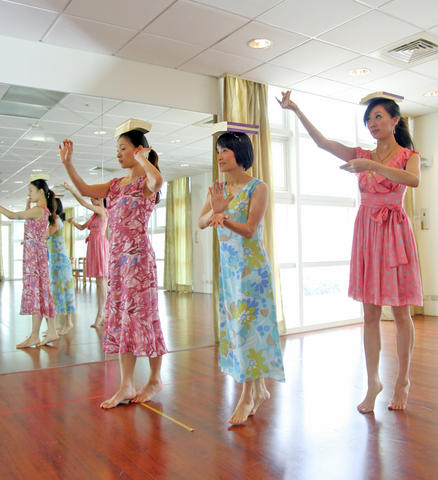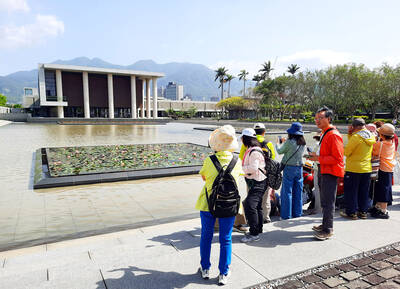No matter how successful, beautiful and intelligent they may be, unwed women in Asia have to contend with derogatory stereotypes and epithets such as "Christmas cake," a reference to the cake Japanese eat on Dec. 25 and throw away on Dec. 26, and "New Year's Eve noodles," which refers to bachelorettes aged over 31.
At weddings they are matched up with potential partners by well-intentioned friends and at other family gatherings are questioned as to why they've remained single.
Yan Mei-chen (顏美珍), the creator and director of Flora, has been on the receiving end and feels that other single women can relate to her experience. The assumption that single women are always on the lookout for potential partners is one of many misperceptions that Yan addresses in her latest production being staged by Workshop in Heaven Theater (黑門山上的劇團) this weekend at the National Experimental Theater.

PHOTO: COURTESY OF WORKSHOP IN HEAVEN
"People living in the city have a particular image of women," said Blanca Chung (鍾欣怡), the production's promoter. It is an image, Chung says, that many women often feel uncomfortable with.
The play is directed to those 20- and 30-somethings who place career over relationships and the frustration often felt because they are expected to "get married, have a family [and] stay at home."
Yan, a career-minded women over 35, who is unwilling to compromise her freedom of creativity for a relationship, dispensed with words for her performance and focuses on gestures - movements that Chung says will speak to Taiwanese women.
"In European or American modern dance, they have different body language because of culture and history. And in Japan, there are even several different modern [styles of] dance within that culture," she said.
Chung said Yan drew inspiration from the work of respected European choreographer Pina Bausche.
However, whereas Bausche, who will perform in September at the National Theater, employs a combination of snippets of dialogue with action, the creators of Flora forgo dialogue altogether. Doing so, says Chung, enables the audience to become totally engrossed in the actors' movements.
Focusing on movement also has its practical purposes; it appeals to a wider audience.
"The last time we were in Bengal for a theater festival, we performed a play in Chinese that seemed to be lost on most of the audience," Blanca said.
The performance has separate plots; the first tells of a country girl who moves to the big city and matures through her experiences.
The second reveals the ways in which men pick up women and how the movement of men changes in the presence of women. The third investigates the relationship between a mother and daughter.
"Usually, a dance group finds dancers and [teaches] them how to act. But this time, because we are a theater group, we are teaching actors how to move," she said. "Our director is not a choreographer [but] a theater director."
To perfect the motions on the stage, Yan invited movement director Chou I-wen (邱怡文) and dancers from Cloud Gate Theater (雲門舞集) to help produce the play.

When the South Vietnamese capital of Saigon fell to the North Vietnamese forces 50 years ago this week, it prompted a mass exodus of some 2 million people — hundreds of thousands fleeing perilously on small boats across open water to escape the communist regime. Many ultimately settled in Southern California’s Orange County in an area now known as “Little Saigon,” not far from Marine Corps Base Camp Pendleton, where the first refugees were airlifted upon reaching the US. The diaspora now also has significant populations in Virginia, Texas and Washington state, as well as in countries including France and Australia.

On April 17, Chinese Nationalist Party (KMT) Chairman Eric Chu (朱立倫) launched a bold campaign to revive and revitalize the KMT base by calling for an impromptu rally at the Taipei prosecutor’s offices to protest recent arrests of KMT recall campaigners over allegations of forgery and fraud involving signatures of dead voters. The protest had no time to apply for permits and was illegal, but that played into the sense of opposition grievance at alleged weaponization of the judiciary by the Democratic Progressive Party (DPP) to “annihilate” the opposition parties. Blamed for faltering recall campaigns and faced with a KMT chair

As we live longer, our risk of cognitive impairment is increasing. How can we delay the onset of symptoms? Do we have to give up every indulgence or can small changes make a difference? We asked neurologists for tips on how to keep our brains healthy for life. TAKE CARE OF YOUR HEALTH “All of the sensible things that apply to bodily health apply to brain health,” says Suzanne O’Sullivan, a consultant in neurology at the National Hospital for Neurology and Neurosurgery in London, and the author of The Age of Diagnosis. “When you’re 20, you can get away with absolute

Dull functional structures dominate Taiwan’s cityscapes. But that’s slowly changing, thanks to talented architects and patrons with deep pockets. Since the start of the 21st century, the country has gained several alluring landmark buildings, including the two described below. NUNG CHAN MONASTERY Dharma Drum Mountain (法鼓山, DDM) is one of Taiwan’s most prominent religious organizations. Under the leadership of Buddhist Master Sheng Yen (聖嚴), who died in 2009, it developed into an international Buddhist foundation active in the spiritual, cultural and educational spheres. Since 2005, DDM’s principal base has been its sprawling hillside complex in New Taipei City’s Jinshan District (金山). But